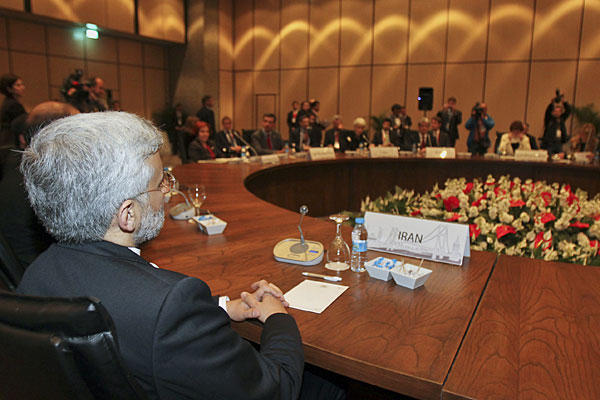The Western members of the P5+1 are showing signs of serious intent, if re-election of President Barack Obama allows nuclear-related talks with Iran to resume in the next few months.
This ought to be cheering news for all who believe that this dispute can be resolved according to the provisions of the Nuclear Non-Proliferation Treaty (NPT), enhanced by some well-chosen, voluntary confidence-building measures.
Yet scepticism remains in order. Why? Several past opportunities to resolve the dispute through negotiation and confidence-building have been squandered. Two vital questions also remain imponderable: is Iran’s Supreme Leader really interested in a nuclear settlement, and will Israeli politicians resist the urge to exercise Israel’s formidable powers of influence in Western capitals to close down the political space for a negotiated outcome?
The Supreme Leader has not hidden his distrust of the United States and his aversion to the West’s “dual-track” approach. In August 2010, for instance, he is reported to have said: “We have rejected negotiations with the US for clear reasons. Engaging in negotiations under threats and pressure is not in fact negotiating.” And at Friday Prayers on 3 February 2012 he said:
We should not fall for the smile on the face of the enemy. We have had experience of them over the last 30 years… We should not be cheated by their false promises and words; they break their promises very easily. They feel no shame. They simply utter lies.
Does he, in addition, calculate that a nuclear settlement would not be in the interest of the Islamic Republic, even if the terms were fair and consistent with the NPT?
I have come across people who believe that this is the case. They argue that Iran’s leaders need the nuclear dispute to prevent a thaw in relations with the US which might bring about unwelcome social change; to mobilise popular support for the Islamic Republic; to distract attention from political repression, human rights abuses and the corrupt practices of an elite; and to excuse economic mismanagement.
I have no evidence for saying that this view is mistaken. If, however, I try to look at the issue “from the other side of the hill”, it seems to me that the Supreme Leader could afford to give up the nuclear dispute as a domestic political instrument; he would still be left with several other ways of arousing indignation against the West and of avoiding a thaw in relations with the US. And in cost/benefit terms, the gain from a nuclear settlement — if it results in the lifting of all nuclear-related sanctions — looks to me enticing.
On the other side of the equation, we are all familiar with the arguments Israel’s leaders will deploy if they do not want a nuclear settlement. They will claim that an Iranian enrichment capacity, though not outlawed by the NPT, and even if subject to international inspection, represents a threat to Israel’s survival. They will remind us that Iran is the world’s “leading sponsor of terror”, even though many of us know that the process which leads to a state being branded a “sponsor of terror” is highly political and highly partial. They will assert that continuing uranium enrichment in Iran will compel Saudi Arabia and Turkey to violate their NPT obligations and become nuclear-armed. They will point to Iran’s lamentable human rights record.
We are also familiar with their motives: to convince the US that Iran remains a threat to US interests in the Middle East, against which an indispensible ally, Israel, is a necessity (cf. Trita Parsi’s A Single Roll of the Dice); to justify an absence of progress in the Middle East peace process; to distract attention from their lack of interest in a Middle East free of Israel’s nuclear weapons; and to create common ground with Gulf monarchs who fear and loath Iran.
Until now Israel’s political harvest from keeping the Iran Nuclear pot at simmering temperature has been rich (I hope I can be forgiven a mixed metaphor). So it is hard to imagine that Israeli politicians will abstain from applying pressure on the West in 2013, if Iran fails to do their job for them by aborting renewed negotiations, and if things appear to be heading towards a settlement.
Yet the story could have another ending. Perhaps this time Western politicians will recall their primary responsibility: the welfare of those who elect them. Safeguarded Iranian nuclear activities pose no threat to the security of these voters. These voters are paying a price for the imposition on Iran of oil and other trading and investment sanctions. And a war on Iran, inevitable in the absence of a negotiated settlement, would entail risks to Western living standards, as well as to Western lives.
But enough! These musings will seem the stuff that dreams are made of if Governor Romney is elected and some of his neoconservative advisers are let loose on Iran policy.






“Nuclear talks” with Iran will always be sabotaged by the US because the issue the US
has with Iran has nothing to do with Nuclear weapons or nuclear anything. It is simply
an excuse to start a war. The goal is to
install a compliant regime in Iran that will accept a private central bank and sell it’s
oil for US petro-dollars. The real threat
of Iran, Iraq, Libya and every other country
we invade is that they are abandoning the US petro-dollar which has been all that is
propping up the worth fiat US dollar since
Nixon closed the gold window in 1971 and defaulted on US gold backed currency. Saudi Arabia is past peak oil and soon will not be
able to control OPEC and maintain Petro-dollar hegemony, When that happens the US dollar will collapse and with it the entire US economy. This is why we are invading these countries and installing private central banks that we control.
I agree overall with Fred54 on importance of oil for preservation of dollar’s hegemony; but remember that the present day international commerce is huge and oil is a small fraction of that. What should also be studied is the role of military spending in a market economy. For example, in early 19th century, UK’s spending in military was in double digits of GOP. This was to a great extent the engine that moved the economy and innovation. I like see more economic study of the role of military in capitalist societies.
Isn’t it also interesting that in the last few days you see abundance of articles which while criticizing Obama endorse him by saying that the probability of Romney attacking Iran is higher, in progressive circles. What they are saying may be true – although I doubt it – but what a cheap way of selling yourself this is. At least, tea part gets something for supporting Republicans; progressive offer themselves for nothing to Democrats!! Bizarre.